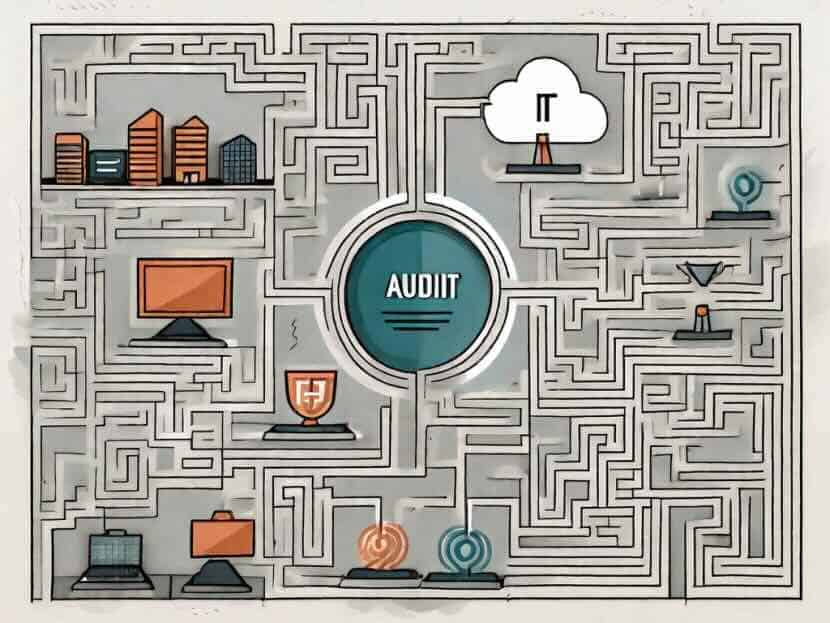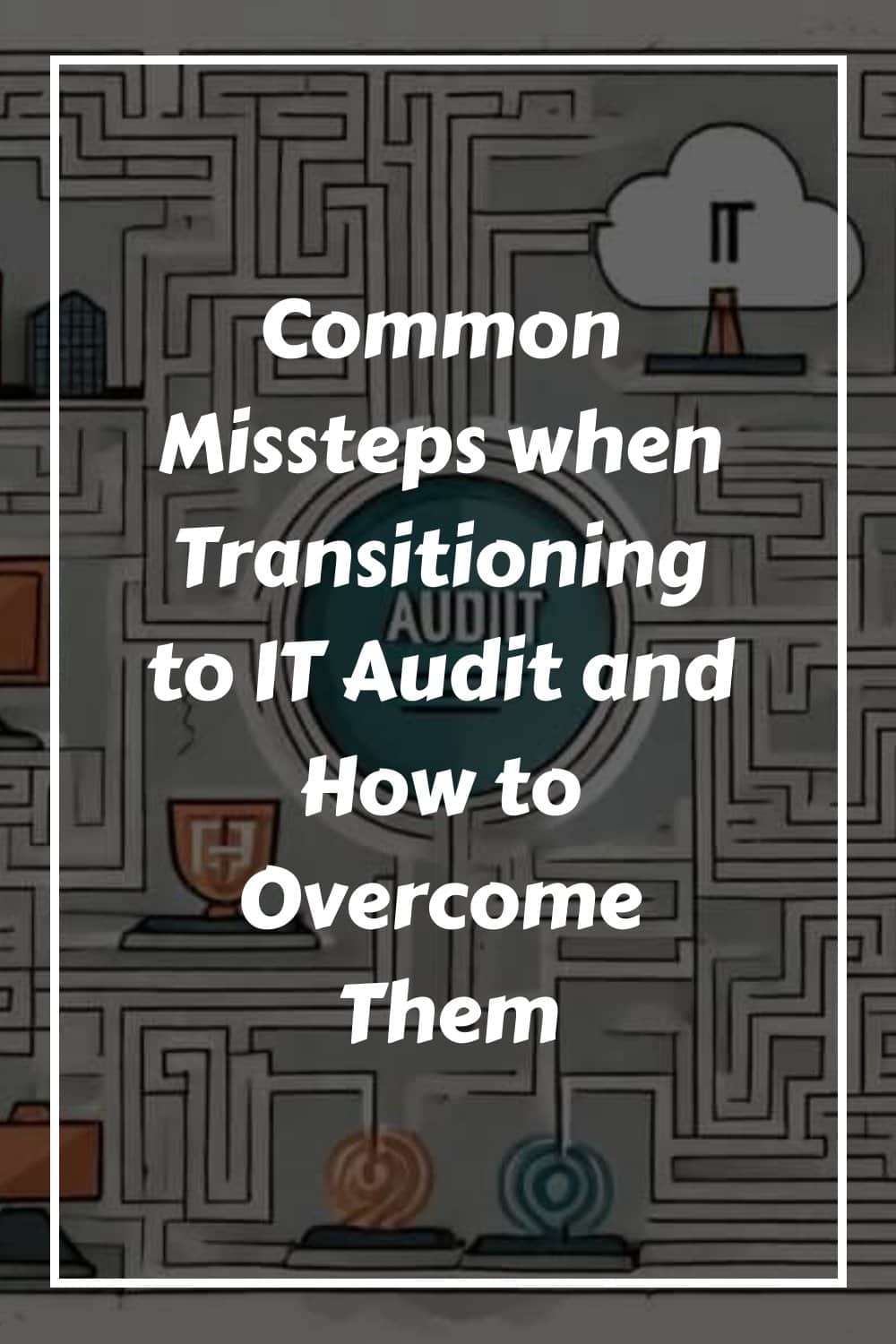- Overlooking Soft Skills Crucial for Client Interactions
- Ignoring Continuous Learning as IT Audit Constantly Evolves
- Underestimating Networking Power: Connections Open Opportunities
- Relying Solely on Traditional Audit Experience
- Not Tailoring Your Resume Because Generic Resumes Get Overlooked
- Neglecting Certifications Because They Validate Your Expertise
- Overlooking Online Presence: Your Digital Footprint Matters
- Disregarding Industry Trends: Staying Current is Essential
- Identifying and Avoiding Common Pitfalls in an IT Audit Transition
- Key Challenges of Transitioning to IT Audit
- The Importance of Soft Skills
- Continuous Learning in the Ever-Evolving IT Audit Landscape
- Building a Relevant Professional Network
- Adapting to the Unique Challenges of IT Audit
- Crafting a Tailored Resume for IT Audit Positions
- The Value of Relevant Certifications
- Managing Your Online Presence
- Staying Current with Industry Trends
The shift from traditional to IT audits can be exciting and challenging. While there are many opportunities for growth and development in this field, there are also common missteps that can hinder your progress. In this article, we will explore some of the most common missteps when transitioning to IT audit and provide strategies for overcoming them.
Overlooking Soft Skills Crucial for Client Interactions
One of the common missteps individuals make when transitioning to IT audit is overlooking the importance of soft skills. While technical knowledge is undoubtedly essential, developing strong interpersonal and communication skills is equally important. Being able to communicate with clients and stakeholders effectively is crucial in building trust and maintaining positive relationships.
To overcome this misstep, consider investing time and effort in improving your communication skills. Seek opportunities to practice presenting complex technical information in a clear and concise manner. Additionally, develop active listening skills to understand client needs and expectations better. Remember, strong client relationships are built on effective communication.
When it comes to client interactions, soft skills play a vital role in ensuring successful outcomes. Imagine a scenario where you have all the technical expertise required to solve a client’s problem but struggle to effectively convey your ideas and recommendations. This can lead to misunderstandings, confusion, and, ultimately, a breakdown in the client relationship.
By honing your soft skills, you can avoid such pitfalls and positively impact your clients. Effective communication lets you clearly articulate your thoughts, ideas, and recommendations, ensuring that your clients fully understand your expertise and the value you bring.
Furthermore, developing strong interpersonal skills enables you to build rapport and trust with your clients. It allows you to connect beyond your work’s technical aspects, making your clients feel heard, understood, and valued. This, in turn, fosters a collaborative and cooperative environment where clients are more likely to engage with you openly and provide the necessary information for a successful audit.
Active listening, another crucial soft skill, involves hearing what your clients say and understanding their underlying needs and concerns. It requires giving your full attention, asking clarifying questions, and empathizing with their perspective. By actively listening, you can uncover valuable insights, identify potential issues, and tailor your approach to meet each client’s specific requirements.
Moreover, effective communication and strong interpersonal skills go hand in hand with problem-solving and conflict resolution. Challenges and conflicts are bound to arise in the IT audit world. However, with the right soft skills, you can navigate these situations with finesse, finding mutually beneficial solutions and maintaining a positive working relationship.
In conclusion, while technical knowledge is undoubtedly crucial in IT audit, overlooking the importance of soft skills can hinder your success in client interactions. Investing time and effort in developing strong interpersonal and communication skills can build trust, maintain positive relationships, and achieve successful outcomes in your IT audit career.
Ignoring Continuous Learning as IT Audit Constantly Evolves
Transitioning to IT audit can be an exciting and challenging endeavor. However, there are common missteps that individuals often make when entering this field. One such misstep is ignoring the importance of continuous learning.
The field of IT audit is constantly evolving, with new technologies and methodologies emerging regularly. Failing to stay updated with the latest industry trends and advancements can hinder your professional growth and limit your ability to provide valuable insight to clients. It is crucial to recognize that the landscape of IT audit is dynamic, and what may be considered best practices today could become outdated tomorrow.
To overcome this misstep, it is essential to make a commitment to ongoing learning. Embracing continuous learning allows you to stay relevant and adapt to the ever-changing IT audit environment. By actively seeking out new knowledge and skills, you can enhance your professional development and increase your value as an IT auditor.
One way to stay informed about the latest developments in IT audit is by regularly attending industry conferences, webinars, and workshops. These events provide opportunities to learn from industry experts, gain insights into emerging trends, and network with peers. Participating in professional forums and blogs can expand your knowledge base and expose you to different perspectives and experiences.
Engaging in discussions with colleagues is another valuable way to enhance your continuous learning journey. You can gain a deeper understanding of various IT audit concepts and approaches by exchanging ideas and insights. Collaborating with others in the field can also help you stay updated on new tools and techniques that may improve your auditing processes.
Furthermore, taking advantage of online resources is crucial in today’s digital age. Numerous websites, online courses, and virtual communities arededicated to IT audit. These resources offer a wealth of information, ranging from technical guides to case studies, that can further expand your knowledge and keep you up to date with the latest industry practices.
Continuous learning is not just about acquiring new knowledgebut also about applying it in practical scenarios. As an IT auditor, seek opportunities to apply what you have learned in real-world situations. This hands-on experience will reinforce your understanding and enable you to develop critical thinking and problem-solving skills.
In conclusion, ignoring the importance of continuous learning is a common misstep when transitioning to IT audit. However, by making a commitment to ongoing learning, staying informed about the latest developments, engaging with colleagues, and leveraging online resources, you can stay ahead of the curve and enhance your value as an IT auditor. Embrace continuous learning as an integral part of your professional journey and thrive in the ever-evolving field of IT audit.
Underestimating Networking Power: Connections Open Opportunities
In the realm of IT audit, connections play a vital role in advancing your career. Underestimating the power of networking can be a common misstep for individuals transitioning to this field. Building a strong professional network can lead to valuable opportunities, such as job referrals, mentorship, and access to industry insights.
To overcome this misstep, actively invest in expanding your professional network. Attend industry events and conferences to meet like-minded professionals and potential mentors. Engaging in conversations and exchanging ideas with experts in the field can broaden your knowledge and expose you to new perspectives.
Furthermore, joining relevant professional associations and online communities can provide you with a platform to connect with individuals who share your passion for IT audit. These communities often offer forums, discussion boards, and networking events where you can interact with experienced professionals and seek guidance on career development.
Networking requires effort and initiative, but the connections you make can open doors to new possibilities in your IT audit career. By actively participating in networking activities, you increase your visibility within the industry and enhance your chances of being recommended for job opportunities. Building relationships with influential individuals can also lead to mentorship opportunities, where you can learn from their experiences and gain valuable insights into the field.
Additionally, networking can provide you with access to industry insights and trends. By connecting with professionals who are actively involved in IT audits, you can stay updated on the latest technologies, best practices, and regulatory changes. This knowledge can give you a competitive edge in your career and help you adapt to the evolving landscape of IT audit.
It is important to approach networking with a genuine interest in building meaningful connections. Instead of solely focusing on what you can gain from others, take the time to listen, learn, and contribute to the conversations. Networking is a two-way street; by offering your expertise and support to others, you can establish mutually beneficial relationships that can last throughout your career.
In conclusion, networking is a powerful tool that should not be underestimated in the field of IT audit. By actively investing in expanding your professional network, attending industry events, joining professional associations, and engaging in online communities, you can open doors to new opportunities, gain valuable insights, and advance your career in IT audit.
Relying Solely on Traditional Audit Experience
Transitioning to IT audit requires a shift in mindset from traditional audit practices. Relying solely on your previous audit experience without adapting to the unique challenges and complexities of IT auditing can lead to common missteps. Acknowledging that IT audit requires a specialized skill set and knowledge base is crucial.
Invest in learning IT audit best practices and methodologies to overcome this misstep. Familiarize yourself with relevant frameworks, such as COBIT and ITIL. Seek out training opportunities to gain hands-on experience with specialized IT audit tools and technologies. By expanding your skills and knowledge in IT audit, you can position yourself for success in this field.
When transitioning from traditional audit to IT audit, it is important to understand the fundamental differences between the two. While traditional audit focuses on financial statements and internal controls, IT audit delves into the realm of technology systems, networks, and data security. This shift requires auditors to develop a new set of skills and expertise.
One key aspect of IT audit is understanding the various frameworks and standards that govern the industry. COBIT (Control Objectives for Information and Related Technologies) is a widely recognized framework that provides guidance on IT governance and control objectives. ITIL (Information Technology Infrastructure Library) is another framework that focuses on IT service management. Familiarizing yourself with these frameworks will help you navigate the complexities of IT audit.
In addition to frameworks, gaining practical experience with specialized IT audit tools and technologies is essential. These tools enable auditors to assess the effectiveness of IT controls, identify vulnerabilities, and detect potential risks. By familiarizing yourself with these tools, you can enhance your ability to perform comprehensive IT audits and provide valuable insights to organizations.
Furthermore, staying up-to-date with the latest trends and developments in the IT audit field is crucial. Technology is constantly evolving, and new threats and vulnerabilities emerge regularly. By actively engaging in professional development activities, such as attending conferences, webinars, and workshops, you can stay informed about the latest industry practices and ensure that your skills remain relevant.
Lastly, networking with professionals in the IT audit field can provide valuable insights and opportunities for growth. Joining industry associations, participating in online forums, and connecting with experienced IT auditors can expand your knowledge base and open doors to new career prospects. Building a strong professional network will enhance your understanding of IT audits and provide a support system for ongoing learning and development.
In conclusion, transitioning from traditional audit to IT audit requires a proactive approach to learning and adapting. By investing in specialized training, familiarizing yourself with relevant frameworks and tools, staying informed about industry trends, and networking with professionals, you can position yourself for success in the dynamic field of IT audit.
Not Tailoring Your Resume Because Generic Resumes Get Overlooked
When transitioning to IT audit, neglecting to tailor your resume to the specific requirements of the role can be a major misstep. Generic resumes often fail to highlight the unique skills and experiences necessary for success in this field. Employers are looking for candidates who can demonstrate their IT audit expertise.
To overcome this misstep, take the time to customize your resume for each IT audit position you apply for. Highlight relevant certifications, technical skills, and specific experiences related to IT audit. Avoid using generic buzzwords and instead focus on showcasing your unique qualifications. By tailoring your resume, you increase your chances of standing out as a qualified candidate in the competitive IT audit job market.
When customizing your resume for an IT audit position, consider including specific details about your experience in conducting risk assessments. Highlight any instances where you have identified vulnerabilities in an organization’s IT systems and implemented effective controls to mitigate those risks. This will demonstrate your ability to analyze complex IT environments and provide valuable insights to improve security and compliance.
In addition to technical skills, employers also value candidates who possess strong communication and interpersonal skills. Include examples of how you have effectively communicated audit findings to technical and non-technical stakeholders. Emphasize your ability to translate technical jargon into clear and concise language that can be easily understood by all parties involved.
Furthermore, showcasing your knowledge of industry standards and regulations is crucial in the IT audit field. Mention your experience working with frameworks such as COBIT, ISO 27001, or NIST. Highlight any certifications you hold in these areas, as they demonstrate your commitment to staying up-to-date with the latest best practices and compliance requirements.
When tailoring your resume, don’t forget to include any relevant experience you have in conducting IT audits in different industries. Whether it’s finance, healthcare, or manufacturing, showcasing your versatility and adaptability will make you a more attractive candidate. Provide specific examples of audits you have conducted in these industries and the unique challenges you faced.
Lastly, consider including any leadership or project management experience you have in your resume. IT audit roles often require candidates to lead teams or manage projects, so highlighting your ability to effectively manage resources, meet deadlines, and deliver high-quality results will set you apart from other applicants.
In conclusion, customizing your resume for each IT audit position is essential to stand out in a competitive job market. You increase your chances of being recognized as a highly qualified candidate by highlighting your unique qualifications, technical skills, industry knowledge, and relevant experiences. Take the time to tailor your resume and showcase your expertise in IT audit to maximize your chances of securing your desired role.
Neglecting Certifications Because They Validate Your Expertise
One of the missteps individuals transitioning to IT audit often make is neglecting to pursue relevant certifications. Certifications validate your expertise in specific IT audit areas and enhance your credibility and marketability within the industry.
To overcome this misstep, identify the highly regarded certifications in the IT audit field, such as Certified Information Systems Auditor (CISA) or Certified Internal Auditor (CIA). Research the requirements and invest time in studying for the exams. Obtaining relevant certifications demonstrates your commitment to professional development and can significantly elevate your career prospects in IT audit.
Overlooking Online Presence: Your Digital Footprint Matters
In today’s digital age, your online presence plays a crucial role in the professional world. It is a common misstep for individuals transitioning to IT audit to overlook the importance of managing their digital footprint. Employers and clients often conduct online research to gain insights into a candidate’s skills, professionalism, and reputation.
To overcome this misstep, carefully manage your online presence. Create a professional profile on platforms such as LinkedIn and regularly update it with relevant experiences and achievements. Demonstrate your expertise by sharing industry insights and engaging in professional discussions through blogs or social media. Consistently ensure that your online presence aligns with your professional goals in IT audit.
Disregarding Industry Trends: Staying Current is Essential
Disregarding industry trends is a common misstep when transitioning to IT audit. Staying current with emerging technologies, regulatory changes, and industry advancements is vital for success in this field. Failing to adapt to new trends can hinder your ability to provide valuable insights and recommendations to clients.
To overcome this misstep, commit to staying informed about the latest developments in IT audit. Subscribe to industry newsletters, follow thought leaders in the field, and participate in relevant webinars and conferences. Continuously seek opportunities to expand your knowledge and skills to ensure you provide clients the most up-to-date guidance.
Identifying and Avoiding Common Pitfalls in an IT Audit Transition
Transitioning to IT audit is not without its challenges. Identifying and avoiding common pitfalls is important to ensure a smooth and successful transition. By recognizing these potential missteps, you can take proactive measures to overcome them.
Key Challenges of Transitioning to IT Audit
Transitioning to IT audit presents unique challenges that individuals must be prepared to face. Understanding these challenges and strategizing ways to overcome them can significantly contribute to a successful transition and long-term career growth in IT audit.
The Importance of Soft Skills
When transitioning to IT audit, it is crucial to recognize the importance of developing and refining soft skills. While technical knowledge is essential, effectively communicating, collaborating, and building relationships is equally vital. IT auditors often interact with clients, stakeholders, and technical teams, requiring strong interpersonal and communication skills.
Continuous Learning in the Ever-Evolving IT Audit Landscape
As technology continues to advance, the IT audit landscape evolves rapidly. Failing to stay updated with the latest developments can hinder your effectiveness as an IT auditor. Embracing a mindset of continuous learning is crucial for staying ahead and providing valuable insights to clients.
Building a Relevant Professional Network
Networking plays a significant role in the success of IT auditors. Building a strong professional network can provide access to valuable opportunities, such as mentorship, job referrals, and industry insights. Connecting with like-minded professionals and industry leaders can open doors to new possibilities in your IT audit career.
Adapting to the Unique Challenges of IT Audit
Transitioning to IT audit requires a shift in mindset from traditional audit practices. It is essential to recognize the unique challenges and complexities of IT auditing, such as specialized technical knowledge and familiarity with relevant frameworks and regulations. Embracing the demands of IT audit and investing in expanding your skills can significantly contribute to your success in this field.
Crafting a Tailored Resume for IT Audit Positions
Generic resumes often fail to highlight the unique skills and qualifications needed for IT audit roles. Neglecting to tailor your resume can result in missed opportunities. Highlighting relevant certifications, technical expertise, and specific experiences related to IT audits can significantly increase your chances of standing out as a qualified candidate.
The Value of Relevant Certifications
Obtaining relevant certifications in IT audit can enhance your credibility and marketability. Certifications validate your expertise in specialized areas and demonstrate your commitment to professional development. Pursuing certifications such as CISA or CIA is highly regarded in the IT audit field and can open doors to new career opportunities.
Managing Your Online Presence
In today’s digital age, managing your online presence is essential. Employers and clients often conduct online research, and having a positive online reputation can significantly impact your professional opportunities. Creating a professional profile on platforms such as LinkedIn and consistently aligning your online presence with your professional goals can help enhance your credibility in the IT audit field.
Staying Current with Industry Trends
Disregarding industry trends can hinder your ability to provide valuable insights to clients. Staying informed about emerging technologies, regulatory changes, and industry advancements is crucial for success in IT audits. Continuously seeking opportunities to expand your knowledge and skills in line with industry trends will ensure you are equipped to provide the most up-to-date guidance to clients.
In conclusion, transitioning to IT audit can be an exciting yet challenging journey. By being aware of and actively working to overcome common missteps, you can position yourself for success in this dynamic field. Develop your soft skills, embrace continuous learning, and leverage the power of networking and certifications. Tailor your resume, manage your online presence, and stay current with industry trends. By taking these proactive measures, you can confidently navigate the transition to IT auditand maximize your career opportunities.









